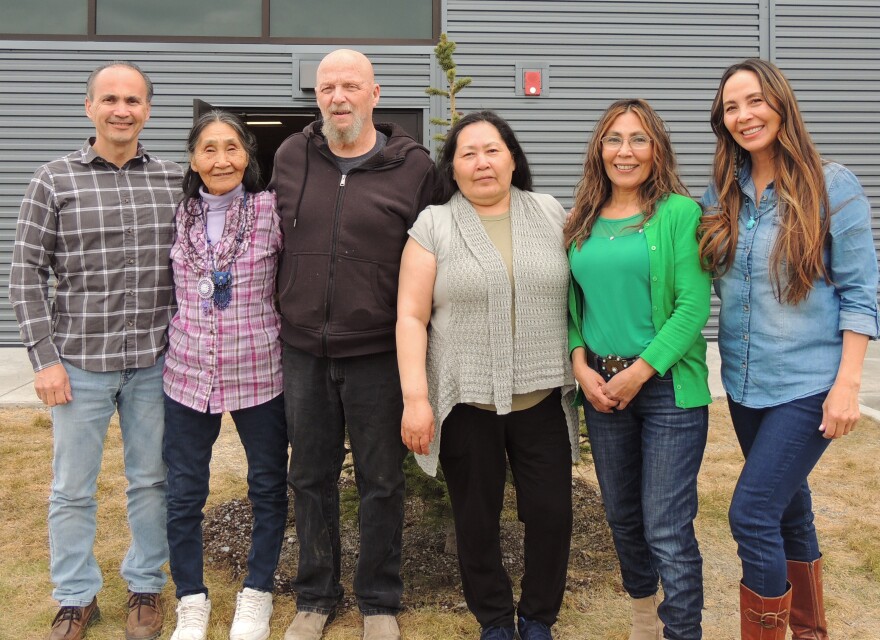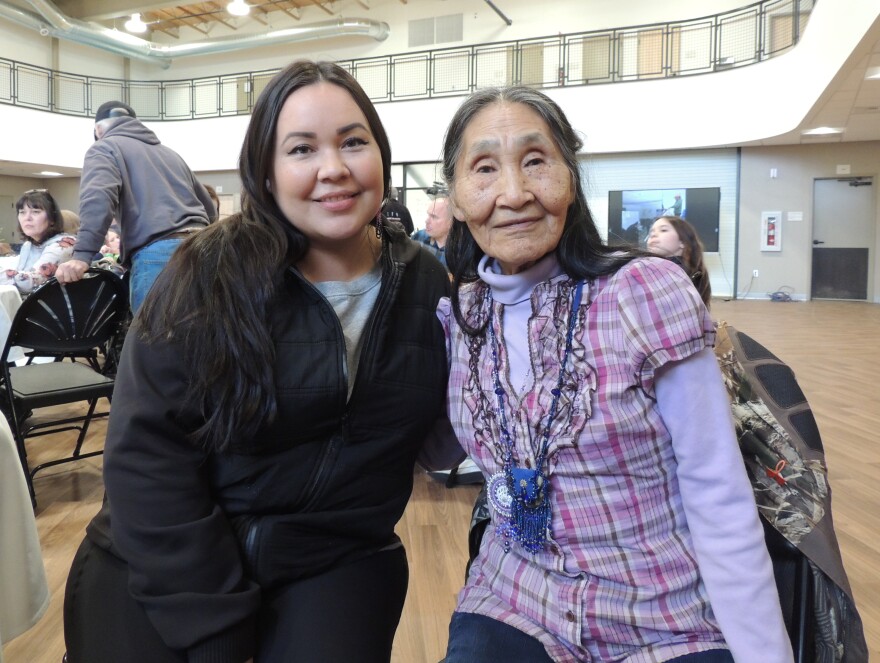The University of Alaska Fairbanks is awarding Dena'ina Elder Helen Dick an honorary Doctor of Education degree this spring for her years of work as an instructor of Dena’ina to language learners of all ages.
On Monday evening, family, friends and tribal members gathered for a potluck at the Kenaitze Indian Tribe’s educational campus to celebrate the Dena’ina elder.
“When I found out that she was getting this, I was floored,” said Dick’s daughter, Elizabeth Solie of Soldotna.
Solie said her mom has worked her whole life to pass down what she knows.

“Not to get an award, not to get a degree, but to help people,” she said. “So it just means a lot for us because she’s very talented and knowledgeable in her language. And then ‘living Dena’ina’ — life skills and making birch bark baskets.”
Today, Helen Dick is one of just a few living first-language speakers of Dena’ina. She was born in 1945 in Lime Village, in Southwest Alaska.
Friend Jon Ross said Dick learned the language from her family.
“She studied with many many people that were her family members. Her dad, Pete Bobby, and her grandparents,” he said. “She never actually went to one single day of American school. Yet she has all this knowledge from her ancestors.”
Kenaitze Elder Sharon Isaak held up a booklet of photos she had put together for Dick — showing them holding up beads and working together on a moose hide.

In every picture, Dick is beaming.
“This picture depicts her joy,” Sharon said, pointing to one of Dick holding a moose ear.
Sharon’s son, Joel, started working with Dick a little over 10 years ago, while he was doing undergraduate research to learn to work with moose hides and fish skin. Dick taught him how to work with the parts of the moose, like to use part of the heart to make a bag.
Joel said Dick has an indigenous style of teaching.
“She is willing to teach people if they want to learn, and are actually willing to do the learning,” Joel said. “And similar with the moose hide, the language is the same thing: You have to show up and you have to do the work.”
Today, Joel is passing on the lessons he’s learned from Dick as a linguist with the tribe. He's part of a new generation working on language and culture revitalization efforts — with younger kids, at the new educational building where the ceremony was hosted, and in classes with Kenai Peninsula College, through its Alaska Native studies programs.
Andrea Ivanoff, Dick’s granddaughter, has been part of those efforts, too. She spends time with her grandmother every day, transcribing stories and phrases she tells her in Dena’ina.
They’ve created stories for kids and worked together on an online Dena’ina audio dictionary project

“I think it’s important, since we have the resources and the writing system to do it,” Ivanoff said. “Because nowadays, that’s how a lot of people learn, and different people have different learning styles. And so, to be able to have it written down and have the spelling and make signs and books, and for the children — I think it’s important.”
She said that knowledge skipped a generation, because of the systematic suppression of indigenous language learning in schools. .
“There was a whole generation that kind of lost it, so they just didn’t speak it anymore,” she said. “And now we’re trying to bring it back.”
It’s work that’s touched many Dena’ina language learners — including many of the people in the room Monday.
There wasn’t much time for Dick to sit down during the potluck, with friends and students passing along "congratulations" between each speech. Each time, Dick greeted them with a warm smile and big hug.
During the ceremony, Joel Isaak addressed the crowd.
“If you’ve learned from Helen, or any of the teachers in the room who have been in the room, please stand up,” he said.
This time, it was the audience's turn to stand.





